~~ Burns Night 2013 ~~
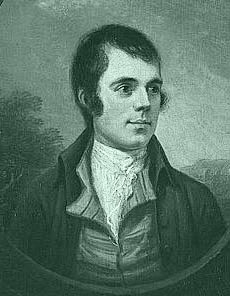 The lodge held a Burns Night Supper on the 19th February 2013 after the Lodge meeting, Ladies, Widows and non-Masons were invited. The lodge held a Burns Night Supper on the 19th February 2013 after the Lodge meeting, Ladies, Widows and non-Masons were invited.
The Haggis was 'Piped-in' in true Scottish tradition.
Burns suppers are held as a celebration of the life and poetry of the poet Robert Burns, author of many Scots poems. The suppers are normally held on or near the poet's birthday, 25 January, sometimes also known as Robert Burns Day (or Robbie Burns Day or Rabbie Burns Day) or Burns Night, although they may in principle be held at any time of the year.
Burns suppers are most common in Scotland and Northern Ireland but occur throughout the world wherever there are Burns Clubs, Scottish Societies, expatriate Scots, or aficionados of Burns' poetry or any Society that likes a Burns Night. There is a particularly strong tradition of them in southern New Zealand's main city Dunedin, of which Burns' nephew Thomas Burns was a founding father.
The first suppers were held in Ayrshire at the end of the 18th century by Robert Burns' friends on the anniversary of his death, 21 July, In Memoriam and they have been a regular occurrence ever since. The first Burns club, known as 'The Mother Club', was founded in Greenock in 1801 by merchants born in Ayrshire, some of whom had known Burns. They held the first Burns supper on what they thought was his birthday on 29 January 1802, but in 1803 discovered from the Ayr parish records that the correct date was 25 January 1759, and since then suppers have been held on 25 January, Burns' birthday.
Burns suppers may be formal or informal. Both typically include haggis (a traditional Scottish dish celebrated by Burns in his 'Address to a Haggis'), Scotch whisky and the recitation of Burns' poetry. Formal dinners are hosted by organisations such as Burns Clubs, Freemasons (Robert Burns was a Scottish Freemason) or St Andrews Societies and occasionally end with dancing when ladies are present. Formal suppers follow a standard format.
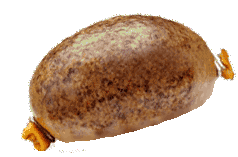 Haggis is a savoury pudding containing sheep's pluck (heart, liver and lungs); minced with onion, oatmeal, suet, spices, and salt, mixed with stock, and traditionally encased in the animal's stomach and simmered for approximately three hours. Most modern commercial haggis is prepared in a sausage casing rather than an actual stomach. Haggis is a savoury pudding containing sheep's pluck (heart, liver and lungs); minced with onion, oatmeal, suet, spices, and salt, mixed with stock, and traditionally encased in the animal's stomach and simmered for approximately three hours. Most modern commercial haggis is prepared in a sausage casing rather than an actual stomach.
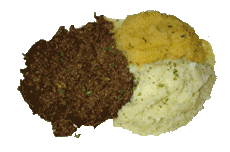 Haggis is a traditional Scottish dish, considered the national dish of Scotland as a result of Robert Burns' poem Address to a Haggis of 1787. Haggis is traditionally served with "neeps and tatties" (Scots: turnip and potato), boiled and mashed separately and a dram (a glass of Scotch whisky), especially as the main course of a Burns supper. However it is also often eaten with other accompaniments. Haggis is a traditional Scottish dish, considered the national dish of Scotland as a result of Robert Burns' poem Address to a Haggis of 1787. Haggis is traditionally served with "neeps and tatties" (Scots: turnip and potato), boiled and mashed separately and a dram (a glass of Scotch whisky), especially as the main course of a Burns supper. However it is also often eaten with other accompaniments.
[ en.wikipedia.org/wiki/Burns_supper ]
'Burns the Freemason'
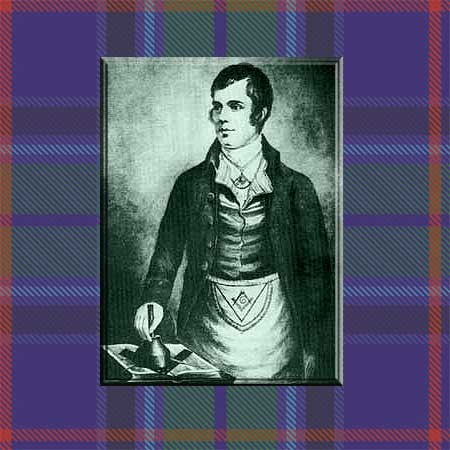 Robert Burns was initiated an Entered Apprentice in Lodge St. David, Tarbolton on 4 July (ironic date) 1781, at the age of 23. His initiation fee was 12s 6d, and paid on the same date. Like many other times in his life, Burns came into the lodge amidst a controversy. Originally, there had been only one lodge in Tarbolton, chartered in 1771 from the Kilwinning Lodge, which is said to be the oldest lodges in the world (again, another story worth telling, yet for another time). Robert Burns was initiated an Entered Apprentice in Lodge St. David, Tarbolton on 4 July (ironic date) 1781, at the age of 23. His initiation fee was 12s 6d, and paid on the same date. Like many other times in his life, Burns came into the lodge amidst a controversy. Originally, there had been only one lodge in Tarbolton, chartered in 1771 from the Kilwinning Lodge, which is said to be the oldest lodges in the world (again, another story worth telling, yet for another time).
In 1773, a group broke away from the lodge, forming Lodge St. David No. 174, and the original lodge became St. James Tarbolton Kilwinning No. 178, only to be reunited in 1781, 9 days before Burns's first degree. However, while St. James was clearly the older of the two lodges, St. David's name was used, and the seeds were sown for further dissension. Burns in the meantime was passed to the degree of Fellow Craft, and raised to the degree of Master Mason on lst October 1781.
This is an extract from the Robert Burns.org.uk website and to read more about Burns the Freemason click [ Here ]
Image of Burns Tartan is Crown Copyright from the Scottish Register of Tartans. (Free Licence)
|


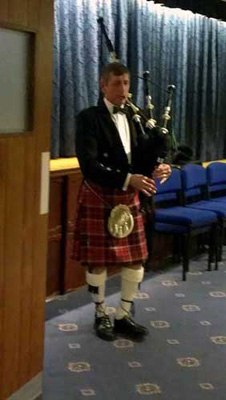
 The lodge held a Burns Night Supper on the 19th February 2013 after the Lodge meeting, Ladies, Widows and non-Masons were invited.
The lodge held a Burns Night Supper on the 19th February 2013 after the Lodge meeting, Ladies, Widows and non-Masons were invited. Haggis is a savoury pudding containing sheep's pluck (heart, liver and lungs); minced with onion, oatmeal, suet, spices, and salt, mixed with stock, and traditionally encased in the animal's stomach and simmered for approximately three hours. Most modern commercial haggis is prepared in a sausage casing rather than an actual stomach.
Haggis is a savoury pudding containing sheep's pluck (heart, liver and lungs); minced with onion, oatmeal, suet, spices, and salt, mixed with stock, and traditionally encased in the animal's stomach and simmered for approximately three hours. Most modern commercial haggis is prepared in a sausage casing rather than an actual stomach. Haggis is a traditional Scottish dish, considered the national dish of Scotland as a result of Robert Burns' poem Address to a Haggis of 1787. Haggis is traditionally served with "neeps and tatties" (Scots: turnip and potato), boiled and mashed separately and a dram (a glass of Scotch whisky), especially as the main course of a Burns supper. However it is also often eaten with other accompaniments.
Haggis is a traditional Scottish dish, considered the national dish of Scotland as a result of Robert Burns' poem Address to a Haggis of 1787. Haggis is traditionally served with "neeps and tatties" (Scots: turnip and potato), boiled and mashed separately and a dram (a glass of Scotch whisky), especially as the main course of a Burns supper. However it is also often eaten with other accompaniments. Robert Burns was initiated an Entered Apprentice in Lodge St. David, Tarbolton on 4 July (ironic date) 1781, at the age of 23. His initiation fee was 12s 6d, and paid on the same date. Like many other times in his life, Burns came into the lodge amidst a controversy. Originally, there had been only one lodge in Tarbolton, chartered in 1771 from the Kilwinning Lodge, which is said to be the oldest lodges in the world (again, another story worth telling, yet for another time).
Robert Burns was initiated an Entered Apprentice in Lodge St. David, Tarbolton on 4 July (ironic date) 1781, at the age of 23. His initiation fee was 12s 6d, and paid on the same date. Like many other times in his life, Burns came into the lodge amidst a controversy. Originally, there had been only one lodge in Tarbolton, chartered in 1771 from the Kilwinning Lodge, which is said to be the oldest lodges in the world (again, another story worth telling, yet for another time).